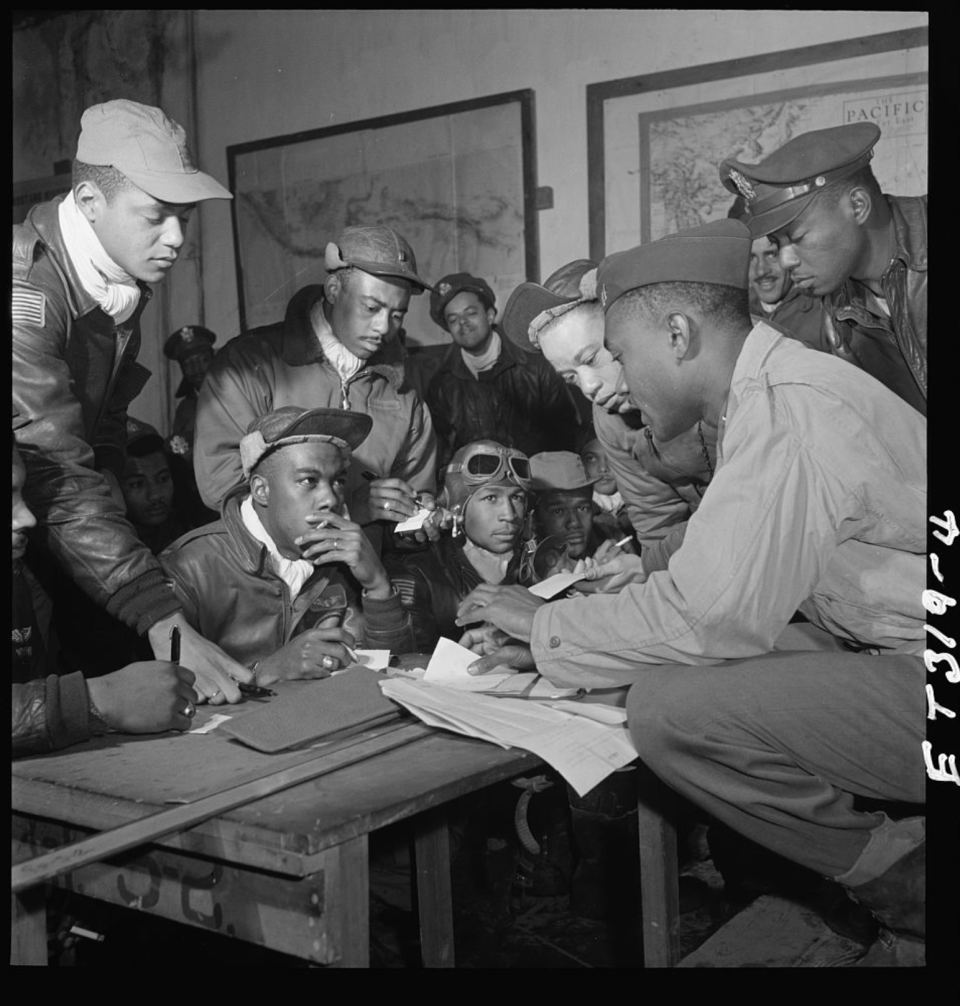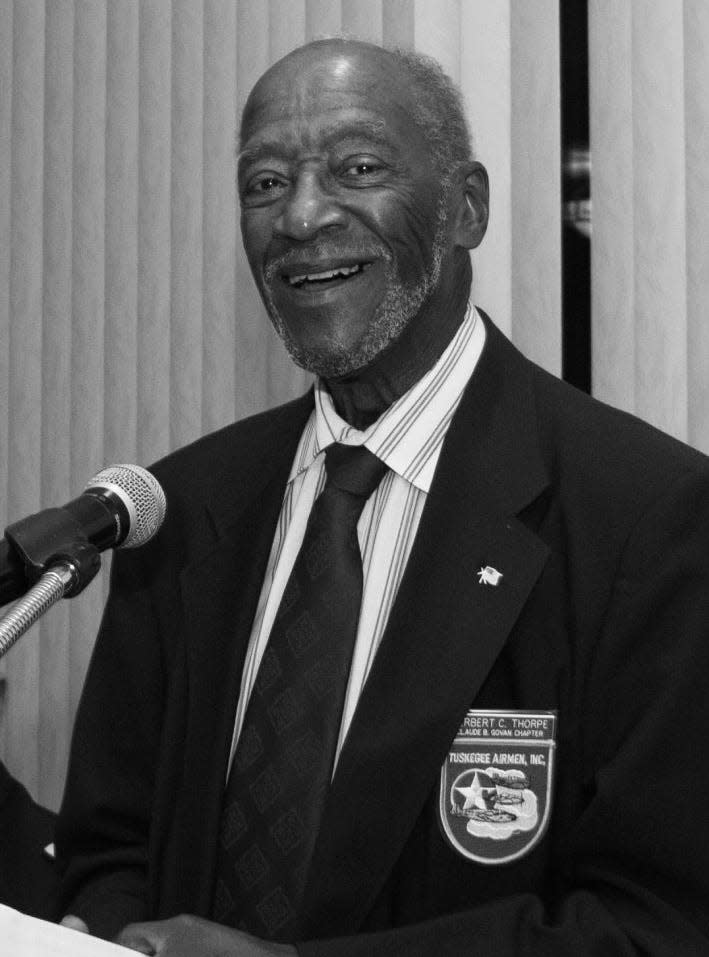Role model, mentor, gentleman: Tuskegee Airman Herbert Thorpe dies at 101
Local centenarian Herbert Thorpe passed away on Jan. 28 at the Rome Memorial Hospital.
Those close to him described him as a role model, mentor, and a gentleman. The funeral will be held at noon on Saturday, Feb. 10, at the First Presbyterian Church in Rome.
Thorpe flew with the Tuskegee Airmen, rising above racial barriers during World War II.

In the 1970s, he became a founding member of the Rome NAACP Chapter. Up until the spry age of 101, he continued to mentor Jackie Nelson, the current Rome NAACP chapter president.
Nelson stayed with Thorpe during his final week.
“We all must learn from Herb’s legacy,” Nelson said. “It’s important for regional students to know and study all of his accomplishments. His work advanced our culture forward.”
From Tuskegee Airman to electrical engineer
Like many Americans in the 1940s, Thorpe enlisted in the U.S. Army, though he couldn't have anticipated he’d soar with the Tuskegee Airmen above WWII-era racial discrimination.
The Tuskegee Airmen were the first African-American military aviators in the United States armed forces. They later became a cornerstone of the civil rights movement.
After enlisting in the Army, Thorpe attended the U.S. Signal Corps School for a year before he left New York to attend basic military training at Fort Dix, N.J., and Kearns Field, Utah. He completed his altitude testing in Utah and transferred to Aviation Cadet School at Tuskegee Institute in Alabama.
After Primary Flight School at the Institute, he transferred to Basic Training Flight School at Tuskegee Army Air Field (TAAF). Commissioned as a 2nd Lieutenant, Navigator/Bombardier, in 1944, Thorpe returned to Tuskegee. He began Advanced Flight Training school and qualified as a B-25 (Twin-engine) pilot at TAAF in 1945.
Thorpe returned to Brooklyn to attend New York University under the GI Bill and graduated as an electrical engineer in 1953. For six years, he worked as a Radar Systems Engineer at the Brooklyn Navy Yard before transferring to the Rome Air Development Center, known today as Rome Laboratory.
According to laboratory officials, Thorpe was instrumental in creating Identification Friend or Foe (IFF), a system designed for command control. It enabled military air traffic controllers to identify whether an aircraft vehicle was friendly or interrogative.

A long list of accolades
Thorpe was honored with the first New York State Dr. Martin Luther King, Jr. Humanitarian Award in 2012 and again in 2013 for his work in founding the Mohawk Valley Chapter of the NAACP. He and his brother, Richard, trained together at the Tuskegee Institute and flew together stateside.
In 2016, they both received the Congressional Gold Medal for service – the highest civilian award in the United States, alongside the Presidential Medal of Freedom.
Oneida County Executive Anthony Picente Jr. noted when referred to as a war hero, Thorpe would shy away from the attention.
“Herb did not seek appraisal, he shone without needing to be seen," Picente said. "We lost a true patriot in so many ways.”
Picente shared his relief at issuing a proclamation last year naming May 17 as Herbert Thorpe Day in Oneida County, as opposed to doing so posthumously.
“Although it added to his long list of accolades, I still felt it wasn’t enough… he deserved something more like Herb Thorpe Year,” Picente said.
Thorpe was active in the local community up until his final days, Picente said. He was a 50-year member of the First Presbyterian Church of Rome and served as past president of the Rome NAACP Branch and Mohawk Valley Frontiers club.
He was also a charter member at the Prince Hall Military Lodge 112 and the Afro-American Heritage Association.

Condolences and reflections
According to Nelson, Thorpes’ friends went to pick him up for a fish fry when they found he'd been taken ill.
“Rome Memorial Hospital allowed members of the Rome NAACP Branch to sit with Herb for nearly 24 hours before his son arrived,” said Nelson. “At first it was questioned since we weren't his immediate family, but in a way, we always have been.”
Nelson intends to honor Thorpe's legacy by ensuring the Rome NAACP Branch continues to help better the community. “Herb was an advocate of human rights and would be proud to see the branch thrive,” she said.
Utica Rescue Mission specialist Steven Taylor also had the privilege of visiting Thorpe in his final hours. He mentioned the peace that came from being able to pray over his body before he passed.
“Until the very moment of his passing, Herb was engaged in planning a busy schedule of events, a poignant testament to his unwavering commitment to service and community," Taylor said. "His tireless efforts have left an indelible mark on our community. Mr. Thorpe was not just a hero; he was also a mentor, a golf buddy, and a very dear friend to me.”
Picente praised Thorpe’s character. He said if we are to be inspired by his life, may it be by his kindness.
“Herb never wore pain on his sleeve. Instead, he wore love," Picente said. "He was special in many ways, but what I will remember is how bright and pleasant he was to be around. When all is narrowed down, it’s his heart that we must learn from.”
This article originally appeared on Observer-Dispatch: Herbert Thorpe, founding member of Rome NAACP chapter, dies at 101

